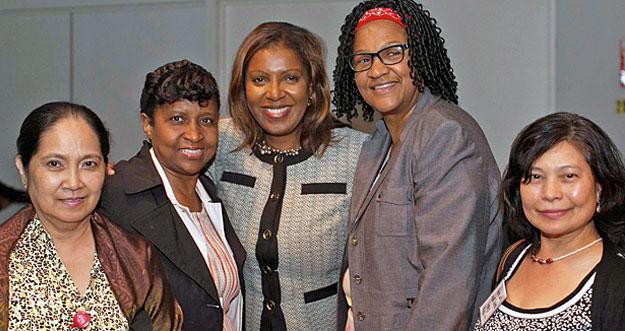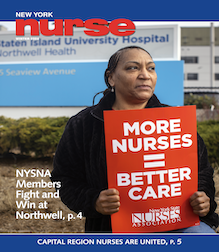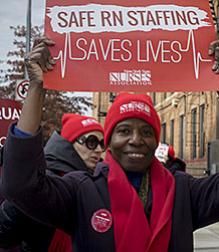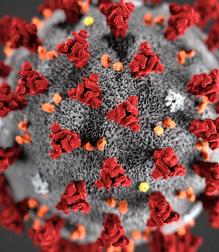
The application by Big Apple Dialysis Management, LLC, to the NYS Department of Health to purchase chronic dialysis patient services and equipment at four HHC hospitals has been stopped three times. Patients, nurses, doctors, public health experts, public health unions and community advocates have persisted in a campaign to protect patient care. To do so, we must continue to press to keep the HHC dialysis clinics within the public system where patient care is outstanding.
Over the course of a year, during which the company’s “competence” to run the clinics – the legal standard of the NYS Department of Health – was under consideration, some members of the state review committees were unconvinced that Big Apple Dialysis’ poor mortality ratings (adjusted death rates) were acceptable. Twenty-five percent of Big Apple Dialysis’ dialysis clinic operations were rated at a poor level of care. In fact, they were in the bottom 10 percent of all dialysis clinics in the U.S. in terms of patient mortality.
In contrast, the HHC clinics up for sale, at Kings County, Lincoln, Harlem and Metropolitan hospitals, all have good-to-excellent ratings on this critical measure of patient mortality.
The question has persisted: Why would HHC replace a clinic system with good performance and outcomes with one of significantly lower quality? And why would the state okay this change?
The first “no” vote
On January 30, 2014, the Committee on Establishment and Project Review of the NYS Department of Health Public Health and Health Planning Council failed to approve the Big Apple Dialysis deal. This was the first “no” vote. “Death rates” were discussed among Committee members and further review and investigation ordered.
A considerable record was developed in the ensuing months, in which NYSNA presented government data on mortality and hospitalizations with support from top experts in the field. These findings provided clear and compelling evidence of the superior outcomes at the HHC units as compared to Big Apple’s on several measures, including all-important death rates.
Two more “no” votes
A year later, on January 29, 2015, at the next meeting of the state review committee, more information was presented, including new testimony from Anne Bové, RN and President, NYSNA’s HHC/Mayorals Executive Council. “We have provided more details and expert support to this Committee on the serious deficiencies of Big Apple Dialysis,” Bové testified. On this date, several committee members raised pointed concerns about the mortality outcomes at Big Apple Dialysis. Public Advocate Letitia James was there, as well, to testify regarding her objections. She reminded the committee that her office’s requests for mortality data on mortality had not been met. She urged that the information be presented to her and to the New York City Council.
Again, the state committee failed to give Big Apple the go-ahead. This was a second “no” vote.
On February 12, 2015, the Public Health and Health Policy Council, the paramount authority at the NYS Department of Health on matters of sales and transfers of healthcare entities, met. Acting without a recommendation from the committee, which had failed to recommend the sale, a lengthy discussion among Council members took place.
At this proceeding, a letter was shared and discussed. Signed by no fewer than 20 nephrologists in the HHC system, these kidney specialists called for a vote against Big Apple Dialysis. The MDs cited the need for a “more rigorous examination of data” and expressed their concerns about “remain[ing] true to both our high standard of patient care and the mission of HHC.”
Again, Big Apple Dialysis failed to muster enough support for its purchase of the HHC clinics. A third “no” vote was recorded, as the needed votes fell short.
The Council ordered its staff to carry out an investigation of the relative mortality rates and to report back at another hearing, to be held on May 21, 2015.
But in our view the Council already has a comprehensive study of mortality and other outcomes at HHC and Big Apple Dialysis clinics, as well as letters from doctors and other experts with supporting analysis and conclusions. Further delay only raises suspicions, as the search for a way around another “no” vote goes on.




